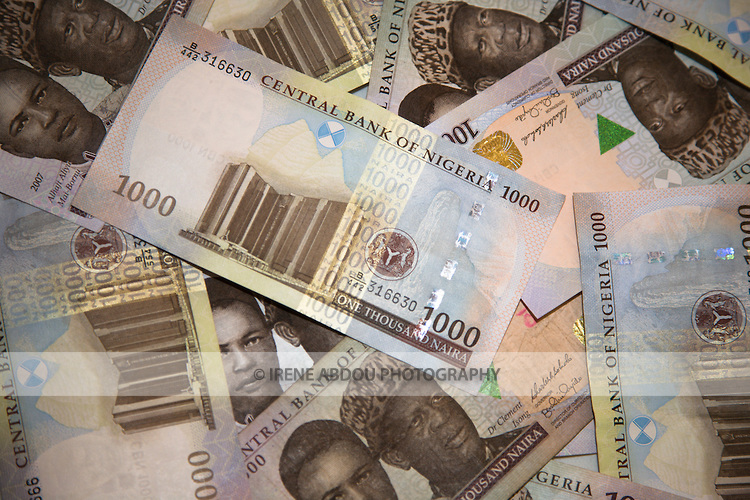- Investors Aren’t Calling an End to Nigeria’s Naira Problem
Nigerian officials are increasingly confident the naira’s troubles are over for good. Some investors disagree.
Portfolio inflows have risen in the past three months with crude prices, rising above $60 a barrel and money managers taking heart from a foreign-exchange trading window, where the naira has converged with the black-market rate.
That prompted central bank Governor Godwin Emefiele and Patience Oniha, the head of the nation’s Debt Management Office, to tell investors in London on Oct. 27 that the currency was set to strengthen. Finance Minister Kemi Adeosun concurred, saying Nov. 2 the government sees no significant exchange-rate risk as it prepares to raise dollar funding.
But Nigeria’s system of capital controls, multiple exchange rates and the trading window known as Nafex would struggle to survive a drop in oil prices or a turn in sentiment against emerging markets, which may come as the Federal Reserve raises interest rates, according to investors including Ashmore Group Plc and Standard Life Aberdeen Plc.
“At the moment, it’s easy for them to manage the current system and muddle through,” said Brett Rowley, a managing director at TCW Group Inc. in Los Angeles, which oversees $200 billion and recently started buying naira debt again after pulling out during the 2014 oil crash. “That could change if we got a significant drop in crude production or prices. That would be a key test to reassure investors they can get their money out even in times of stress.”
Yield-starved global investors have piled billions of dollars back into the country in the second half of this year, attracted by the naira’s devaluation after the Nafex window opened in April and yields on one-year Treasury bills that were above 20 percent for most of the year.
Oil Production
Foreign holdings of Nigerian government debt may have more than doubled from around 5 percent a year ago, according to Standard Chartered Plc. That’s helped the naira to appreciate 2 percent since August to 355.49 per dollar, trimming its loss in 2017 to 13 percent. The yield on one-year T-bills has dropped around 400 basis points in two months to 18.2 percent, still among the highest in major emerging markets tracked by Bloomberg.
For now, Nigeria’s benefiting from a bullish oil market and rampant demand for developing-nation assets. Crude prices have increased 34 percent since June as OPEC members including Saudi Arabia push for output cuts to continue in 2018. And production in Nigeria, which is exempt from the curbs, has risen 15 percent this year to 1.7 million barrels a day. Foreign reserves are up to $34 billion, the highest in almost three years.
But a drop in Brent crude to around $50 a barrel would probably be enough to push Nigeria’s current account back into deficit, according to Bank of America Corp., which sees the naira falling to 432 per dollar by the end of 2018. That could force Nigeria, whose President Muhammadu Buhari has long leaned on the central bank not to let the currency weaken, to choose between selling down its reserves or saving them at the expense of foreign-exchange liquidity.
‘Looking Rosy’
“It’s all looking rosy at the moment for Nigeria,” said Kevin Daly, a fund manager in London at Standard Life Aberdeen, which started buying T-bills soon after the Nafex window opened. “But that could easily change. Will the authorities be comfortable letting the naira drop to 380? That’s not been tested.”
In the longer run, he says, Nigeria will struggle to sustain tight monetary policy, which is key to attracting foreign investors, and import restrictions if it wants the economy to pick up. Output contracted last year for the first time in three decades.
Nigeria will be vulnerable to foreign-exchange shortages as long as it maintains a complicated currency regime and refuses, unlike other oil exporters such as Kazakhstan and Russia, to allow its currency to float freely, says Ashmore. The central bank keeps its official exchange rate, used for government transactions and fuel imports, pegged at 305 against the dollar, almost 20 percent stronger than the Nafex rate.
“Flows in and out of Nigeria aren’t sufficiently free yet for us to be comfortable taking large positions,” said Jan Dehn, the head of research at Ashmore, which oversees $60 billion of emerging-market stocks and bonds but has stayed away from Nigeria for more than two years. “We used to put on massive positions in Nigeria, but we’re very far from getting back to that point.”


 Billionaire Watch4 weeks ago
Billionaire Watch4 weeks ago


 Naira4 weeks ago
Naira4 weeks ago


 Naira3 weeks ago
Naira3 weeks ago




 Naira3 weeks ago
Naira3 weeks ago




 Naira3 weeks ago
Naira3 weeks ago




 Naira2 weeks ago
Naira2 weeks ago
 Commodities3 weeks ago
Commodities3 weeks ago


 Sport Business4 weeks ago
Sport Business4 weeks ago



















